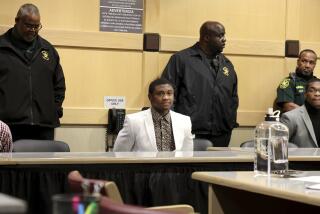Jury Votes for Death of Double Murderer : Courts: Jessie Ray Moffett killed a man and a woman eight years apart. His is the first local death penalty verdict rendered since Robert Alton Harris was executed.
- Share via
In the first local death penalty verdict rendered since Robert Alton Harris was executed in April, a Superior Court jury recommended Tuesday that a double murderer die in the gas chamber.
After deliberating less than four hours, a six-man, six-woman panel decided that Jessie Ray Moffett should die at San Quentin for killing two people eight years apart.
The same jury convicted Moffett one month ago in the 1979 murder and rape of 20-year-old Debra Owen, who was beaten to death at the Linda Vista Recreation Center.
Moffett, 34, was also convicted of fatally shooting 67-year-old Glen Avery in 1987 while Avery was on duty as a security guard at the Kearny Mesa Holiday Inn. Avery’s murder capped a monthlong crime spree that included a string of armed robberies.
Moffett was also convicted of four special circumstances: multiple murders, murder during a robbery, murder during a kidnaping and murder during a burglary. Each special circumstance made the San Diego man eligible for the death penalty.
Moffett showed no emotion as the decision was read by the court clerk, but his wife of five months bowed her head and cried softly.
Several members of the jury smiled at the parents of Debra Owen as the panel walked out of the courtroom after announcing its decision.
“It’s been a long time coming,” said Frank Owen, who waited more than 12 years to see his daughter’s killer brought to justice. In another trial last year, a jury was unable to decide whether Moffett had killed Owen.
Before the verdicts were read, defense attorney Geraldine Russell asked Superior Court Judge William D. Mudd to poll each juror in his chambers because of alleged irregularities in the jury deliberations. Russell pointed out that the panel spent an average of only 20 minutes on each count when it convicted Moffett on June 15 of 17 charges and numerous allegations.
Noting that the jury had asked to be released early Tuesday because one member of the panel had tickets to the All-Star Game, Russell also questioned how the jury could have reached a decision when it announced Monday that it was unable to do so. “I would suggest there’s a problem,” she said.
Mudd refused to call the 12 jurors into his chambers, saying he was not “in the business of harassing jurors.”
After the verdict was read, jurors spoke with attorneys outside the courtroom and said the death penalty verdict was the most difficult decision they had ever made.
Jurors said they decided against sending Moffett to prison for the rest of his life because they felt he had no remorse for his crimes and would not change his ways.
Mudd will formally sentence Moffett on Sept. 2.
More to Read
Sign up for Essential California
The most important California stories and recommendations in your inbox every morning.
You may occasionally receive promotional content from the Los Angeles Times.










